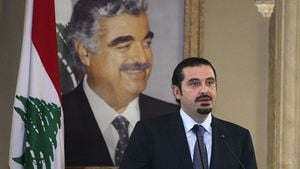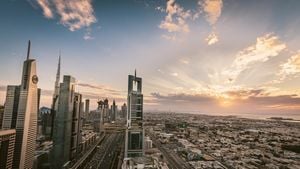Yuriy Napso, Deputy of the State Duma representing the LDPR party, is facing significant consequences due to his extended absence from parliamentary sessions, which may result in the loss of his mandate. According to reports, Vyacheslav Volodin, Chairman of the State Duma, has instructed relevant commissions to investigate the possible revocation of Napso's deputy status. This directive highlights the growing scrutiny over absenteeism among lawmakers, especially within the Kremlin's ranks.
Sources from TASS indicated: 'Vyacheslav Volodin instructed the State Duma commissions on regulations and mandates to address the issue of revoking the deputy powers of Yuriy Napso.’ This decision follows Volodin's comments on Napso's prolonged non-participation, with claims of his absence stretching back two years. The Duma's internal regulations may see significant amendments if action against Napso proceeds.
Napso has been cited as using frequent sick leaves and claiming participation via online means as justifications for his lack of physical presence. These claims have raised questions among his peers. His ability to register for sessions remotely has come under fire, as it seems he could not operate the required parliamentary card without the assistance of colleagues. Reports from Utrenny Yuzh state, 'Volodin mentioned the absence of Napso from the State Duma for the last two years.' This statement reflects mounting frustration with Napso's approach to his responsibilities.
Adding to his troubles, legal challenges have resulted in significant asset confiscation. A Sochi court recently stripped Napso of illegally acquired land and business interests, valued at approximately 12 billion rubles. This development suggests serious personal and professional ramifications for the deputy, contributing to the impetus for his potential ousting from the Duma.
Speculous talks about his potential successor have emerged, with Konstantin Babkin, co-owner of “Rosselemazh,” being named as the likely candidate to replace him should the decision to revoke Napso's mandate be finalized. Bubkin's profile, alongside Napso's, marks yet another chapter for the Krasnodar region’s representation at the national level.
Meanwhile, another Duma member from Krasnodar, Yevgeny Pervyshov, resigned his position amid his transition to another job opportunity. This could lead to yet another election, with reports indicating Yuriy Kostomakha as the leading candidate for Pervyshov’s vacated seat. This flux within the Krasnodar delegation could have far-reaching effects for the region’s political influence.
Further complicities arise from the rules enacted by President Putin, which prevent deputies from leaving the country for personal reasons. On July 13, Putin signed regulations emphasizing the importance of deputies remaining within their jurisdiction to serve their constituencies effectively. Volodin underscored the seriousness of this directive: 'If you are going to Lake Baikal or the Volga, we will support. But if you are going to the Maldives or Bali – then nothing personal, this is wrong with respect to voters.'
Despite these regulations, Napso has managed to continue voicing his opinions remotely, presenting himself as active within the Duma by conducting online meetings with constituents. This method, though questionable, has allowed him to maintain some semblance of activity, even as he reportedly lives full-time in the United Arab Emirates since August.
The complex interplay of legal challenges, personal commitments, and strict parliamentary regulations positions Yuriy Napso at the center of a rapidly developing political event. Will the State Duma uphold standards for attendance and accountability, or will Napso find ways to navigate this storm? The outcome remains significant for both Napso and the institutional integrity of the Duma.



